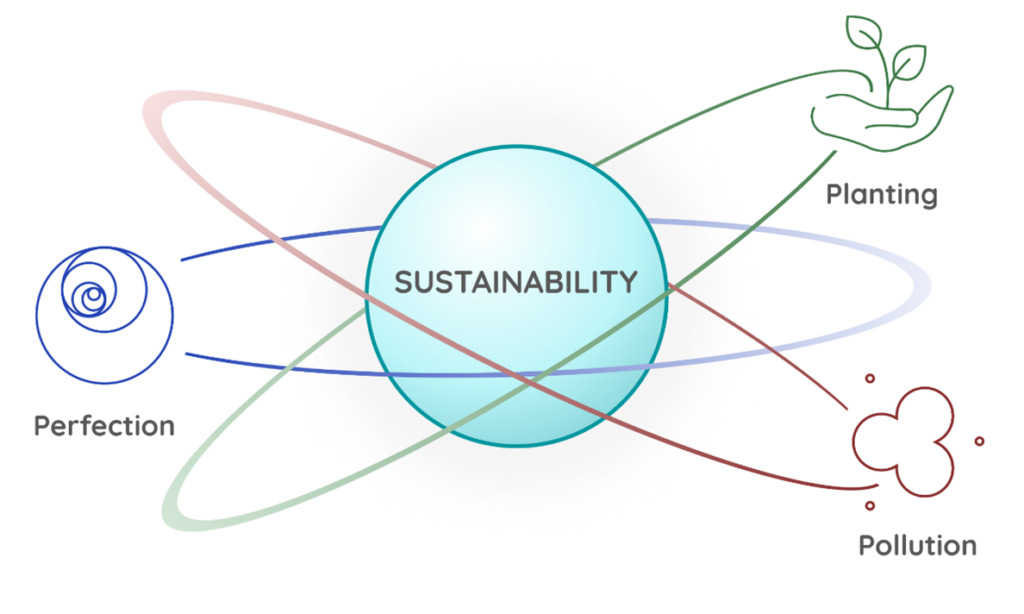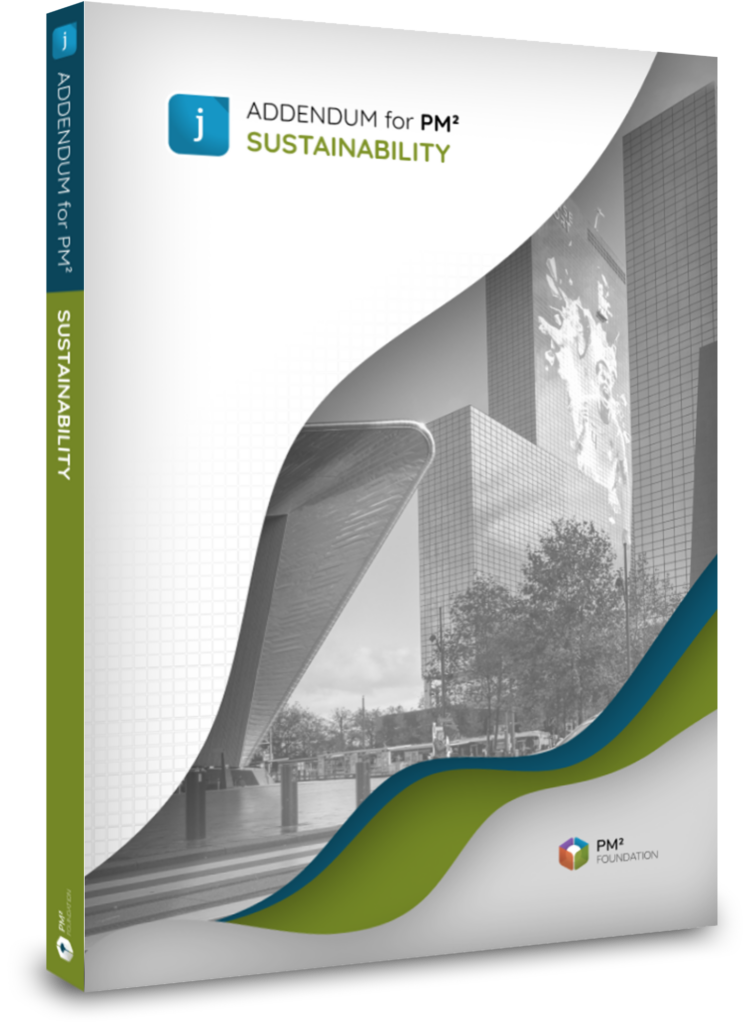PM² Project Management with Sustainability Considerations
Better project management for sustainable results
Incorporating sustainability into project management is no longer a luxury but a necessity in the modern project landscape. This approach is critical for aligning projects with the urgent demands of environmental stewardship, social responsibility, and economic viability.
As the world grapples with challenges like climate change and social inequality, sustainable project management emerges as a key strategy for organisations to make a positive impact while achieving their objectives. It enables organisations to not only meet their current needs but also to safeguard the interests of future generations.

By adopting sustainable practices, organisations can demonstrate their commitment to social responsibility, which often leads to enhanced reputation, stakeholder trust, and long-term success. This holistic approach ensures that project outcomes contribute to a more sustainable and equitable world, aligning project goals with the broader objective of global well-being.
Embracing Sustainability
 Sustainability today is an inclusive concept that encapsulates environmental conservation, social responsibility, and economic resilience. At its core, is about meeting our current needs without compromising the ability of future generations to meet their own. It encompasses a broad range of practices and principles aimed at preserving the environment, ensuring social equity, and maintaining economic viability.
Sustainability today is an inclusive concept that encapsulates environmental conservation, social responsibility, and economic resilience. At its core, is about meeting our current needs without compromising the ability of future generations to meet their own. It encompasses a broad range of practices and principles aimed at preserving the environment, ensuring social equity, and maintaining economic viability.
Sustainability involves managing the triple bottom line a process by which organisations manage their financial, social, and environmental risks, obligations, and opportunities. These three impacts are often referred to as profits, people, and the planet. Sustainability in business typically means ensuring long-term business viability and value by embracing opportunities and managing risks deriving from economic, environmental, and social developments.
Corporate Social Responsibility (CSR) and sustainability are increasingly interconnected concepts representing a shift in how organisations view their role in society and the environment. CSR refers to an organisation’s initiatives to assess and take responsibility for its effects on environmental and social wellbeing. Traditionally, CSR activities have included philanthropy, volunteer efforts, and ethical labour practices. However, in recent years, there has been a significant shift towards integrating sustainability into the core of CSR strategies. This evolution reflects a growing recognition that long-term business success is closely linked to the health of the environment and the communities in which companies operate.
Discover the PM² Advantage: Sustainability Considerations
As organisations seek to align their operations with global sustainability goals, integrating sustainability considerations into project management becomes paramount.
The PM² Methodology, developed by the European Commission, offers a comprehensive framework for effective project management. When combined with sustainability considerations, it becomes a powerful tool for achieving sustainable and responsible outcomes.
The PM² Sustainability Addendum presents sustainability guidelines for the integration and management of sustainability objectives in PM² projects. Its purpose is to serves as a guide for project teams that need to deal with sustainability and the implementation of relevant sustainability regulations and relevant organisational policies.
The PM² Addendum on Sustainability offers:
- A brief introduction to sustainability
- PM² Manifesto for sustainability in project management
- Quick Start Tips for effective implementation
- Guidelines on incorporating sustainable practices in each PM² phase and artefact
- Description of sustainability-related responsibilities
- Mindsets for sustainable project management
- Guidance on sustainable leadership and virtues
- Sustainability checklists for each phase
EU's Commitment to Environmental Sustainability and Policy Initiatives
In recent years, sustainability has evolved from a mere environmental concept to a comprehensive approach that integrates ecological, social, and economic dimensions, reflected in initiatives like the EU’s Green Deal and global frameworks like the Sustainable Development Goals (SDGs).
The ESG framework, SDGs, the European Green Deal, the Just Transition Programme and many other international initiatives are pivotal in guiding organisations, governments, and individuals towards sustainable practices. These initiatives highlight the importance of a balanced approach to development, one that ensures the wellbeing of the planet, its people, and the economy, paving the way for a sustainable future for all.
The European Union is actively engaged in promoting environmental sustainability through various bodies and initiatives. The Directorate General for Environment, a key branch of the European Commission, focuses on the EU’s environmental policy, ensuring environmental protection and sustainable development in line with initiatives like the European Green Deal. Meanwhile, the European Environment Agency provides critical environmental data and analysis, supporting policy decisions and public awareness. The European Parliament and Council contribute by pursuing sustainability goals such as a circular economy and the European Green Deal, emphasizing waste reduction, sustainable design, and efficient resource use. These efforts collectively drive the EU towards a more sustainable, environmentally responsible future.
The application of the PM² Methodology with Sustainability Considerations within an organisation
establishes in practice its commitment to sustainability at all levels.
The PM² Alliance brings the benefits of PM² closer to all
Integrate sustainability principles into all facets of your project management with PM². From the initial stages of drafting project proposals to the intricate details of project execution and reporting, sustainability should be a core focus. This approach not only enhances project effectiveness but also ensures impactful outcomes aligned with environmental and social responsibilities.
To support this integration, the PM² Alliance has specific actions:
- Participates in EU Funded projects on developing and promoting Sustainability in European Project Management (see ESG4Change and SPM²).
- Establish expert committees focused on project and project management sustainability.
- Has formed a working group dedicated to creating content that addresses the unique needs of projects with sustainability considerations.
- Develop partnerships to assist organisations in managing projects with a sustainability focus.
- Provide a PM² certification tailored for project managers and teams on sustainable project management.
Embrace PM² for sustainability in your organisation.
Adeptness in sustainable project management is key for securing funding and grants.
Related Articles & Links:
- The PM² Sustainability Manifesto
- PM² Sustainability Addendum
- Sustainable Leadership – The Cornerstone of Sustainable Project Management
- Sustainability Considerations in Portfolio Management
- Projects in the Circular Economy
- PM² Methodology and Sustainability: A Holistic Approach to Responsible Project Management
- EU Funded Project for ESG4PMChange and https://esg4pmchange.com
- EU-funded Project for Sustainability in PM² – SPM² and https://spm2.eu
